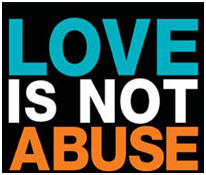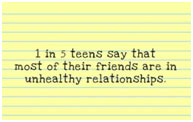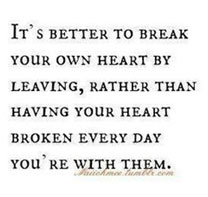How to help someone in an abusive relationship
 Relationships, whether they be with friends, family, or a significant other are hard work. While it is normal for every couple to have arguments and disagree on certain topics, it is HOW these conversations are handled that makes the difference between healthy and unhealthy relationships. It is important that we address the issues happening in our own communities by educating peers, parents, teens, teachers, coaches, and other members of the public on the warning signs of domestic violence.
Relationships, whether they be with friends, family, or a significant other are hard work. While it is normal for every couple to have arguments and disagree on certain topics, it is HOW these conversations are handled that makes the difference between healthy and unhealthy relationships. It is important that we address the issues happening in our own communities by educating peers, parents, teens, teachers, coaches, and other members of the public on the warning signs of domestic violence.
We also want to give you advice on how to solve the problem or help others with this type of potentially dangerous situation. 1 in 3 teens report experiencing dating violence which often includes physical and sexual violence. Some warning signs of behavior of an abuser may include: Jumping quickly into a serious relationship, saying “I love you” right away, controlling your activities and what you wear, jealous behavior by checking all your text messages, wanting to be with you all the time, asking who you are hanging out with, calling and texting you frequently, a quick temper or changing moods, puts you down and calls you names, threatens to kill themselves if you break off the relationship, pressures you into sexual activity, abusive in their past relationships, your friends and family don’t like them, and they destroy items that belong to you. If these red flags sound familiar to your own relationship or someone you know, seek help by calling the YWCA of Niagara Domestic Violence Hotline at (716) 433-6716 or 911 if you are in immediate danger.
 If you recognize someone you love acting distant, skipping or failing school, showing up with bruises, using drugs and alcohol, or overly emotional, they may be involved in a potentially dangerous abusive relationship. The best way to help this person is to believe what they are saying is true, be there for them by truly listening, not threatening to not be their friend until they break-up with the abuser, suggest options like “I can help you tell your parents or someone of authority that you trust,” develop a safety plan in case things escalate and get worse, come up with a “safe word” they can text you if they are in immediate danger so you can call for help. Suggest ways for them to stand up for themselves and remind them that this isn’t what love is all about.
If you recognize someone you love acting distant, skipping or failing school, showing up with bruises, using drugs and alcohol, or overly emotional, they may be involved in a potentially dangerous abusive relationship. The best way to help this person is to believe what they are saying is true, be there for them by truly listening, not threatening to not be their friend until they break-up with the abuser, suggest options like “I can help you tell your parents or someone of authority that you trust,” develop a safety plan in case things escalate and get worse, come up with a “safe word” they can text you if they are in immediate danger so you can call for help. Suggest ways for them to stand up for themselves and remind them that this isn’t what love is all about.
It is often times VERY difficult to break up with the abuser because they remember the good times and are hopeful their partner can change because they promised they would. But their track record and the statistics say otherwise. More than likely they won’t change and you should think about your safety first. Victims don’t always leave their abuser because they are fearful of the violence and threats, this may be their first serious relationship or they grew up in a home with a history of domestic violence so they don’t realize this is not normal. They may have low self-esteem or even believe they somehow deserve this treatment. Sometimes they defend the abuser’s actions by saying “he is just checking all my texts because he is concerned about my safety” which is how an abuser might excuse their controlling behavior. They may be embarrassed that this is happening and are “in over their head” without knowing a way out or strategies to break it off safely.
 The best ways to avoid getting into an abusive relationship is to communicate your boundaries or concern for their bad behavior when you first notice it, address it right when it happens and explain it will not be tolerated. Also if you are dating someone new, avoid dangerous situations. When you go out meet in a well-lit public place, double date with friends, and tell someone your plans for the evening. Don’t use drugs or alcohol as they could impair your judgment and recognition of an unsafe situation and keep your glass with you at all times to avoid someone slipping any “date rape drugs” in your drink. Bring money with you in case you need to find alternate transportation home and trust your gut.
The best ways to avoid getting into an abusive relationship is to communicate your boundaries or concern for their bad behavior when you first notice it, address it right when it happens and explain it will not be tolerated. Also if you are dating someone new, avoid dangerous situations. When you go out meet in a well-lit public place, double date with friends, and tell someone your plans for the evening. Don’t use drugs or alcohol as they could impair your judgment and recognition of an unsafe situation and keep your glass with you at all times to avoid someone slipping any “date rape drugs” in your drink. Bring money with you in case you need to find alternate transportation home and trust your gut.
Everyone deserves to be in a healthy, happy relationship with positive communication and respect. You have the right to protect yourself and “say no” if you need to. You have the responsibility to ask for help when you need it and help spread awareness about this topic in your community. Together we can help end Teen Dating Abuse. For more information please visit loveisrespect.org.








